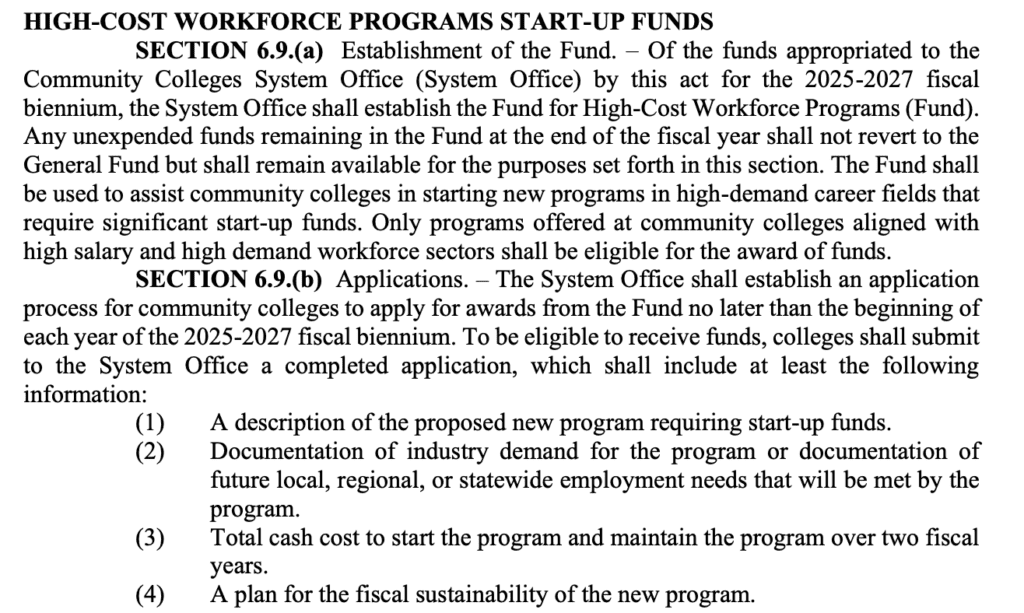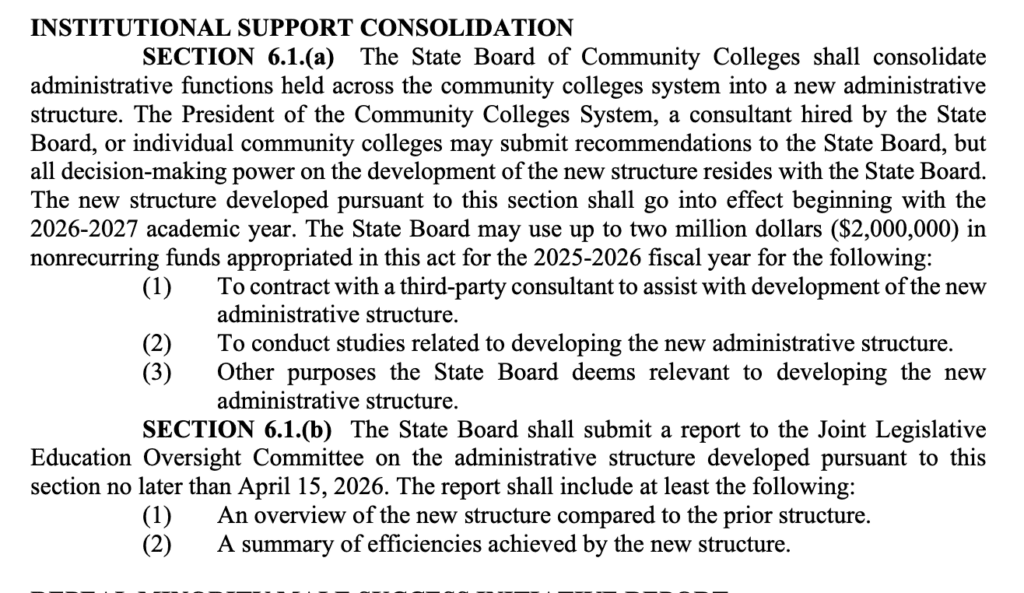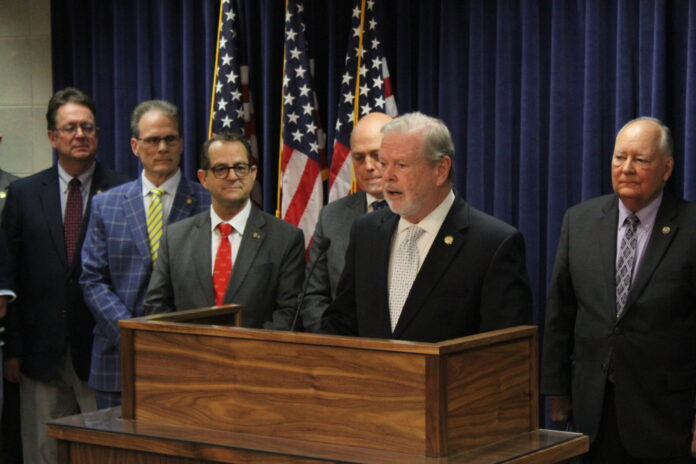The North Carolina Senate released its 2025-27 budget proposal on April 14, allocating approximately $73 million over the biennium for Propel NC, the N.C. Community College System’s (NCCCS) new funding model that was first unveiled in Jan. 2024.
This long session, the system asked lawmakers for nearly $100 million to implement Propel NC, which NCCCS leaders say will better help colleges prioritize connecting students to high-demand, high-wage jobs.
“We’ve seen community colleges across our state become integral partners in supporting business growth and development, and we really want to continue building on those efforts and support high demand industries and fields,” Sen. Michael Lee, R-New Hanover, said on Monday. “This budget will appropriate $36.5 million (each year) to increase funding for pathways related to health care, engineering, advanced manufacturing, trades and transportation, and information technology at community colleges, through the Propel NC initiative.”
The system’s current funding model allocates resources to colleges in proportion to the number of full-time equivalent (FTE) students they enroll in each of their programs. Certain courses receive more state funds than others based on a four-tier funding model.
The primary component of Propel NC would shift the current FTE funding tiers to “workforce sectors,” with courses ranked and valued by statewide salary job demand data every three years. All curriculum and continuing education (CE) courses would reside in the same workforce sector.
The anticipated cost of this component of the model is approximately $68.5 million, according to the system.
The Senate budget allocates $73 million over the biennium for “workforce sector tier reorganization.”
“The North Carolina Community College System’s budget priorities focus on modernizing and stabilizing funding for North Carolina’s community colleges to better align with workforce demands, economic growth, and operational needs,” the system’s legislative agenda says.
The system also requested $24.4 million to increase base funding to account for inflation, $6 million in non-recurring funds to establish an enrollment increase reserve, and for colleges to keep their excess tuition receipts on years when the system as a whole has excess receipts.
Those three components were not included in the Senate’s budget proposal. However, the budget did allocate additional funds for workforce investments, including for high-cost programs and programs for students with intellectual and developmental disabilities (IDD).
You can read the full budget money report and bill text on the General Assembly’s website.
Pay and benefits
The Senate budget appropriates $32.6 billion in 2025-26 and $33.3 billion in 2026-27, with $18.6 billion and $18.9 billion going toward education each year — making up about 57% of each spending plan.
The budget’s net appropriation for community colleges is about $1.8 billion for both years of the biennium — an increase from the last budget, which allocated $1.5 billion per year.
In addition to Propel NC funds, the budget also includes a 1.25% raise for most state employees in Fiscal Year 2025-26, along with a $1,500 bonus each year of the biennium.
“Our K-12 public schools, UNC System campuses, and community colleges are incredible assets to our state, and our budget recognizes that by increasing pay, supporting student outcomes, and improving workforce development offerings,” Lee said in a Senate press release.
The Senate’s proposal would also increase state funds to the State Health Plan, which provides health care coverage to nearly 750,000 teachers, charter school employees, community college employees, other state employees, retirees, and dependents.
The plan is currently facing a large deficit, leading the State Health Plan’s Board of Trustees to consider raising pricing and changing benefits for plan members.
The budget would allocate $21.9 million over the biennium to the plan for system and community college employees.
Other workforce investments
In addition to the $73 million allocated to implement Propel NC, the budget also includes several other workforce investments.
First, the proposal provides $12 million over the biennium to the system to support the implementation of new workforce programs in high-demand career fields that require significant startup funds.
The program, which was first funded by the General Assembly in 2023 to support high-demand health care careers, requires colleges to “pay a certain percentage of program costs based on the total enrollment of FTE students.” Community colleges can only apply for the funds to support one new program in each pathway per year.
A 2024 system report showed that 53 of 58 community colleges submitted applications for the program.
“These are well utilized, and we thank the General Assembly for these funds,” State Board of Community Colleges Finance Chair Lisa Estep said.
Here’s a look at some of the specifications of the program included in the budget. You can read more starting on page 69 of the bill text.

The budget also includes $3.85 million each year of the biennium to expand the number of colleges participating in the training program for students with IDD. The revised net appropriation for the program is now $7.8 million in each year of the biennium.
The program, Access to Achievement, was launched in 2022 as a pilot with $500,000 allocated by the General Assembly. For the pilot, Catawba Valley and Brunswick community colleges were tasked with providing career pathway opportunities and resources for students with intellectual and developmental disabilities.
In 2023, lawmakers allocated nearly $4 million to offer the pilot at 15 community colleges. Funds were allocated to hire achievement counselors at the community colleges and for classroom materials and programming, a transportation study to determine barriers, and a two-year statewide marketing campaign.
The Senate’s budget proposal would expand the program to 25 community colleges total.
“To the extent funds are appropriated for this purpose, the program shall improve the ability of participating community colleges to offer training and educational components that include improving employability skills and providing on-the-job training and apprenticeships with business and industry for individuals with IDD,” the budget says.
The goal of the program is to:
- Establish best practices for providing vocational training for individuals with IDD;
- Provide financial benefits and counseling;
- Develop strategies on integrating assistive technology;
- Maximize access, with support, to credential and degree programs, including micro-credentials that are established by the State Board of Community Colleges;
- Identify methods to increase orientation and integration of individuals with IDD into the college community to the greatest extent possible; and
- Determine a needs assessment, marketing, and evaluation to serve a broad array of individuals with developmental and other similar disabilities or learning challenges to assure adequate demand for new or existing programs.


Enrollment
Apart from Propel NC, the NCCCS also asked lawmakers to “fully fund FY 2024-25 community college enrollment growth.”
The Senate proposal appropriates $75.8 million each year of the biennium for an enrollment growth adjustment, “based on the change in college enrollment, which increased by 15,277 full-time equivalent (FTE) students, or 6.4%, compared to the amount budgeted for FY 2024-25.”
“(Community colleges) are becoming more popular than ever before,” Lee said on Monday.
Four-year universities are also seeing enrollment growth, according to the budget.
The budget also includes $9.5 million in FY 2025-26 and $11.4 million in FY 2026-27 for the NC Promise Tuition Plan, which supports reduced tuition rates for undergraduates at Elizabeth City State University, Fayetteville State University, UNC at Pembroke, and Western Carolina University.
Through the program, in-state tuition is $500 per semester and out-of-state tuition is $2,500 per semester.
However, the budget does reduce funding for out-of-state students at NC Promise institutions, which would increase out-of-state tuition to $3,000 per semester. The Senate press release says this “allows us to continue to prioritize the needs of North Carolina students.”
According to the UNC System’s website, “The plan has increased educational access, reduced student debt, and grown the state’s economy.”
In North Carolina, some counties have established “Promise” programs for their local community colleges. Some education leaders have advocated for the state to develop a statewide community college promise program.
Alignment with high schools
The Senate proposal also includes several items to align postsecondary and high school education.
First, there is $3.75 million in 2025-26 for the Community College Seamless Skills Initiative to “create a competency-based education (CBE) model that seamlessly connects high school and community college.”
According to the budget, this alignment would allow high schoolers to “explore career pathways, earn dual credit, and fulfill computer science requirements while gaining credentials of value in high-demand technology employment sectors through college credit.”
Fayetteville Technical and Wilkes community colleges would partner to implement the initiative, the budget says. Here’s a look at the main components of the initiative:

Under the initiative, participants will work “with a third-party entity to create a secure, interoperable digital wallet platform capable of issuing, storing, verifying, and sharing learner credentials, including microcredentials, certifications, transcripts, and verified skill records,” the budget says.
The Senate proposal would also establish a Competency-Based Education and High School Redesign Strategic Network, to include the Mooresville Graded School District, Wake County Public Schools, SparkNC, and Mitchell, Wake Tech, Fayetteville Tech, and Wilkes community colleges.
“The Network shall provide a means for each entity to share what it has learned and developed regarding CBE and high school redesign,” the budget says. “The goals of the Network shall be to advance the goals of developing a CBE approach to education across the State.”
There is also $4 million over the biennium to Mooresville Graded School District to “establish the Competency-Based High School/Healthcare and High-Tech Pathways program.” The district will partner with Mitchell Community College to implement the program.
“Funds will be used to contract with a third-party expert in competency-based education to design stackable credentials, hire a staff member to oversee the program, and partner with a third party to develop standards-aligned proficiency scales for content areas in grades 9 through 12,” the budget says.
The budget also includes $1 million “to the System Office to establish time-limited positions at Wake Technical Community College to assist East Wake High School and Knightdale High School in the implementation of the Lighthouse Math Project. The purpose of the Lighthouse Math Project is to offer a gateway college math course to high school students using the artificial intelligence student tutoring program Khanmigo.”
Finally, the budget also directs the State Board of Community Colleges to “conduct a competitive solicitation, including a request for information or a request for proposals, to provide a learning management system (LMS) to all community colleges.”
The solicitation must be completed by Dec. 31, 2025, the budget says.
“Answers to the competitive solicitation shall include information on how the learning management system would align with the learning management systems (i) offered by the Department of Public Instruction to local school administrative units and (ii) used by the constituent institutions of The University of North Carolina.”
Excerpt from Senate budget proposal
On Monday, Senate President Pro Tempore Phil Berger, R-Rockingham, said committee chairs aimed to reduce what he called “obsolete programs” and “bloat” in state agencies.
The budget would eliminate hundreds of vacant positions across government agencies, most of which have been vacant for six months or more. The budget also directs agencies, including the UNC System and NCCCS, to identify areas to make cuts in the budget for the second year of the biennium.
The proposal directs the NCCCS to “reduce funds to the institutional and academic support allotment by 9.9% and directs the SBCC to offset reductions through consolidation of certain administrative functions more centrally across the Community College System.”
Lawmakers will reduce funding in this allocation by $57 million in FY 2026-27, the budget says.
The budget allocates $2 million to “assist the State Board of Community Colleges (SBCC) with the consolidation of administrative functions.”

In addition to the administrative consolidation, the proposal would also eliminate $810,000 each year “provided for a program to increase the progression and completion rates of minority male students.”
The program, the Minority Male Success Initiative, was renamed to the Student Success Initiative during the State Board of Community College’s April meeting. In January, the Board approved its 2023-34 report on the Minority Male Success Initiative (MMSI), which was first established in 2003 and redesigned in 2016-17.
“The purpose of the reframed North Carolina Community Colleges Student Success Initiative is to address and enhance the progression and completion rates of underachieving students within the community college system with the goal of strengthening workforce pipelines by increasing the number of credentialed completers within the System,” the Board document says.
Finally, the budget also reduced funds provided for a 10% to 15% salary adjustment to nursing faculty by $1.1 million each year, due to having unexpended funds. The revised net appropriation is $6 million in each year of the biennium.
Helene aid and funds for individual colleges
- The Senate proposal allocates $2.5 million to the NCCCS to aid colleges that experienced enrollment losses after Hurricane Helene. The system’s legislative request had asked for lawmakers to also “support community college recovery efforts as Hurricane Helene assessments continue.”
- The budget allocates $10 million over the biennium to Wilson Community College to support operations for its biologics training center.
- There is also $8 million over the biennium to Gaston College to support the operations of its Center for Applied Textile Technology. The revised net appropriation is $4.8 million in each year of the biennium.
- Finally, there is $2.5 million to Richmond Community College for capital improvements or equipment at the Hendrick Center for Automotive Training.





